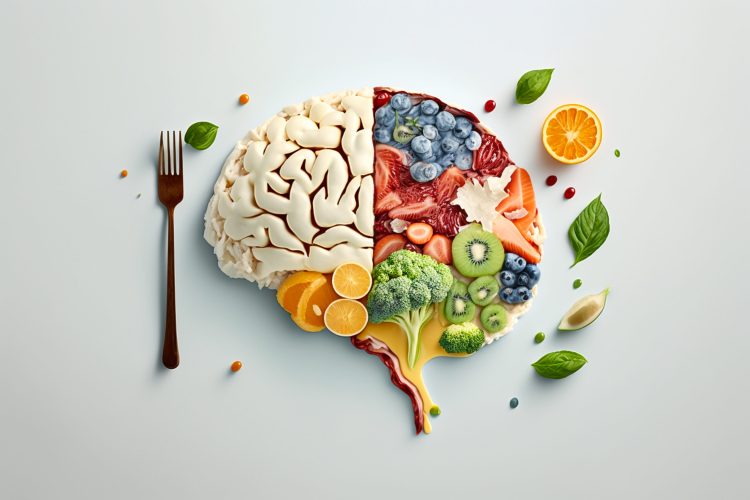There should also be some micronutrients for brain health, which include vitamins and minerals, apart from the calories of energy. Hundreds, if not thousands, of minutes would continue without vitamin B12 or iron intake, and vitamin D would cause disturbances to memory problems with concentration and movements. So this can support your brain.
Table of Contents
ToggleMicronutrients for Brain Health
Micronutrients are required to keep the brain healthy and alert. They are helpful in learning, making brain cells active, and supporting memory. Knowing which nutrients fuel your brain will help you make some informed choices from your diet and supplements. It’s time to get acquainted with some of the most essential players affecting brain health.
Omega-3 Fatty Acids
Omega-3 fatty acids feed a steady, healthy mind. DHA is docosahexaenoic acid; EPA is a different type of this marvelous fat. These fats are building blocks of brain cell membranes and allow smooth communication of neurons. DHA compounds about 40% of fatty acids that are present in the brain, while EPA exists in lesser amounts but plays a major role in reducing inflammation. The structural foundation of your brain consists of 25% omega-3s. Yes, they have research backing.
A study of an older adult with cognitive decline showed that when 900 mg DHA was taken daily for 24 weeks, memory as well as learning abilities improved. Another study showed that for maximizing the effects of Omega3, consume fatty fish such as salmon, mackerel, and sardines at least twice a week; flaxseeds and walnuts for plant-based sources: they’re good, but the body needs must convert them into active forms before using them.
B Vitamins (B6, B9, and B12)
Energy production in brain cells and mood regulation happens through the brain. These vitamins make several neurotransmitters that are important for emotional balance, as well as cognitive functions such as serotonin and dopamine. They are to be taken every single day just because there is no form of storage of these vitamins in the body, and fat-soluble rather than water-soluble. Significantly, only fifteen percent of people more than sixty years old get enough vitamin B12.
Vitamin B6 creates neurotransmitters that affect mood, sleep. Folate, or B9, supports the growth of new brain cells and cognitive ability. Vitamin B12 protects nerves as well as better memory.
B vitamins exist in leafy greens and legumes. As much as a varied diet, it could be satisfying for all the micronutrients for brain health to provide.
Antioxidants and Vitamin D
Vitamin D also becomes a very important nutrient, along with calcium balance in nerve growth and neurotransmission, playing a key role among the essential micronutrients for brain health. It is perhaps also indispensable to reduce inflammatory processes, along with the risks of strokes or dementia. Visual memory would drop due to a serious degree of vitamin deficiency.
Undoubtedly, vitamin D could probably help the brain become more resilient toward diseases like Alzheimer’s and dementia. Vitamin C and E are antioxidants and serve defense for the brain against free radicals. Research has indicated that consuming two portions or more of blueberries and strawberries every week can delay memory declines by up to two and a half years in women. One should have about 300 grams of fruits and vegetables daily to achieve the highest amount of antioxidants. Generally, that is the best in brain protection compounds from berries and other fruits, leafy vegetables, nuts, and leafy greens.
How To Get More Micronutrients Through Food?
When time is on your side, another option to feed the brain could be the use of whole foods; however, it is worth knowing which foods would serve a combination of vitamins, antioxidants, and minerals.

Begin To Plan for Nutrition
Meal-prepped backups for the brain-enhancing foods in your diet are created. Examine your current eating habits, and then boost your nutrient density in each meal. Shop for whole foods and avoid markets and shops as much as possible for processed foods. Stick to cooking methods that retain nutrients: grilling, roasting, or stir-frying will accomplish this.
You may want to keep your nutrients in check every week. The Mind Diet is a fantastic cross between the Mediterranean and DASH Diets. This promotes plant foods high in antioxidants; meanwhile, it minimizes added sugars and saturated fats. Now, set health targets for turbocharging your diet and put aside time to call your dietitian for an individualized meal plan tailored just for you.
Get Your Nutrients from Meal Delivery Services
Formally, the meal delivery option provides a support system for healthy eating while removing the guilt of planning one. The designers of such ongoing meal delivery programs design them in a way that the healthiness and ease of consumption are assumed. This allows your focus to be where it needs to be while you are free to dine on wholesome, nutritious foods, including micronutrients for brain health. It wipes clean the slate of any hindrance to meal planning, creating yet another straightforward approach to fulfilling your nutrition goals.
Portioned Meals Ready to Eat
The control of portions determines how well nutrients are absorbed and how constant they are in enhancing brain functionality. We help one avoid the habit of overeating their way to maximum nutrient intake. Seven out of ten Americans report overeating once or more per week-as the main cause of their overenthusiastic dining. This should, therefore, hold down daily calorie intake at about 20% enhancing equally the nutrient absorption.
Every meal is flash-frozen after being well combined; or so goes their sales pitch. Look at this: Each would go at $8.99 per piece; free delivery for meals totalling $85 and more. Meals are balanced in terms of protein, carbs, and fats-all essential components for energy supply and good micronutrients for brain health.
Bottom Line!
Forming daily habits that nourish the brain comes first. There has always been evidence that a healthy diet composed of antioxidants, healthy fatty acids, and some vitamins increases memory and benefits cognition.
For a healthy brain, focus should increase on nutrient-dense whole foods and judiciously selected supplementation, including micronutrients for brain health. One could order canteen meals with quick brain boosters—like strawberries, nuts, leafy greens, and fatty fish—from anywhere; ensure there is some variety in your meals. The brain accounts for only two percent of our body weight; however, it consumes twenty-five percent of the glucose. Therefore, too much slack on some nutrients may prove harmful.

Constancy Is Nutrition
Some mild deficiency of a few micronutrients essential for brain activity is known to have a major effect on brain function, slightly ameliorating memory problems related to aging, and mildly aiding neurodegenerative diseases. Nutrition requirements can be attained more appropriately by souping up strategies like altering food content and meal delivery terms. A clear example, Muscle Fuel Meals offers meals pre-portioned, liberating its users from the daunting responsibility of providing their brains with adequate nutrients for optimal performance.
Muscle Fuel Meals care for you’re health! Order now.



